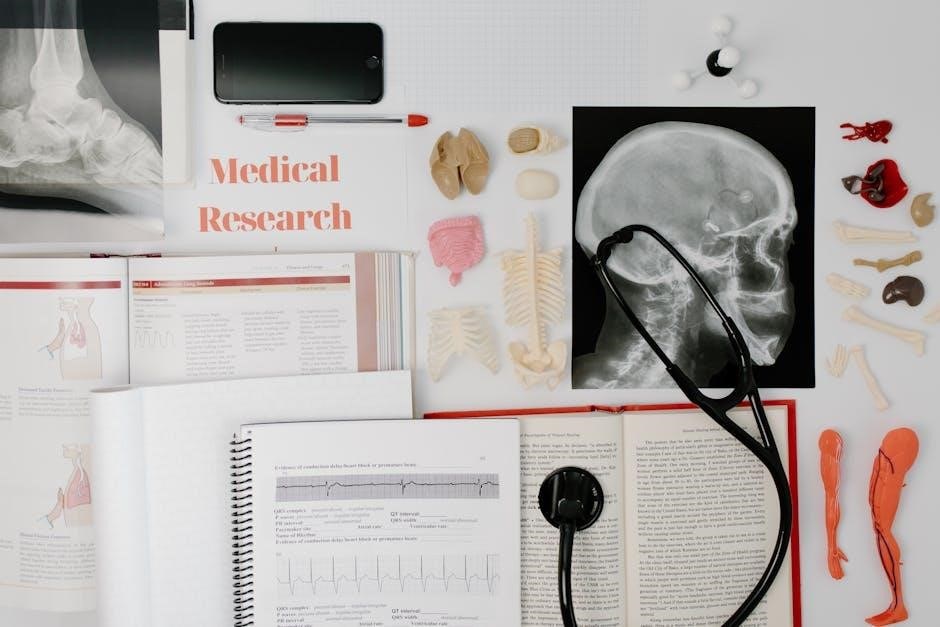The fundamentals of nursing provide a comprehensive foundation for nursing practice, focusing on essential skills and concepts. A study guide helps learners master these basics, ensuring a strong understanding of patient care, safety, and professional responsibilities.
1.1 Key Concepts and Importance of Nursing Fundamentals
The key concepts of nursing fundamentals include patient-centered care, safety, and effective communication. These principles are essential for building trust and ensuring positive health outcomes. A study guide emphasizes these core skills, preparing learners for clinical practice and exams like NCLEX. Mastering these concepts is crucial for delivering high-quality care and upholding professional standards in nursing.
By focusing on fundamental practices, nurses establish a solid foundation for advanced care. These skills are vital for addressing patient needs, preventing errors, and promoting holistic well-being. A well-structured study guide ensures comprehensive understanding, enabling nurses to adapt to diverse healthcare settings and continuous learning demands.
1.2 Historical Development of Nursing as a Profession
Nursing has evolved significantly from its early roots in religious and charitable care. Florence Nightingale pioneered modern nursing during the Crimean War, emphasizing sanitation, compassion, and data-driven practices. The establishment of professional schools and standardized training transformed nursing into a recognized discipline. Over time, nursing has adapted to advances in medicine, technology, and societal needs, becoming a diverse and evidence-based profession. Understanding this history illuminates the foundation of nursing fundamentals and their enduring relevance.

Essential Nursing Skills and Competencies
Nursing skills include clinical proficiency, communication, and critical thinking. Competencies involve patient assessment, care planning, and ethical decision-making, all vital for delivering high-quality, patient-centered care effectively and compassionately.
2.1 Clinical Skills for Patient Care

Clinical skills are essential for delivering effective patient care. These include physical assessments, administering medications, and performing procedures safely. Study guides emphasize mastering these skills through practice and understanding their application in real-world scenarios. They also cover documentation and communication techniques to ensure comprehensive care. Aligning with standards like NCLEX, these resources help nurses develop proficiency in critical areas, ensuring patient safety and optimal outcomes in various healthcare settings. Regular practice and review are encouraged to maintain and enhance these vital competencies.
2.2 Communication and Interpersonal Skills
Effective communication and interpersonal skills are vital in nursing, fostering trust and collaboration between nurses, patients, and families. Study guides highlight the importance of active listening, empathy, and clear expression. Nurses must adapt communication styles to meet diverse patient needs, ensuring understanding and respect. These skills also enhance teamwork among healthcare professionals, promoting a supportive and inclusive care environment. Mastering these abilities is crucial for building strong patient relationships and delivering person-centered care effectively.
2.3 Critical Thinking and Decision-Making in Nursing
Critical thinking and decision-making are essential skills for nurses, enabling them to analyze patient data, identify patterns, and make sound judgments. Study guides emphasize the use of evidence-based practices to guide these processes. Nurses must evaluate patient responses to interventions, prioritize care, and adapt plans as needed. These skills are refined through practice, reflection, and continuous learning, ensuring safe and effective patient care in dynamic healthcare environments.
Foundational Theories and Models in Nursing
Foundational theories and models in nursing provide a framework for understanding patient care. They include concepts like Florence Nightingale’s Environmental Theory and Roy’s Adaptation Model, guiding evidence-based practice.

3.1 Overview of Nursing Theories

Nursing theories are frameworks that define the principles and values guiding nursing practice. They include grand theories like Nightingale’s Environmental Theory and middle-range theories such as Roy’s Adaptation Model. These theories help nurses understand patient care, health promotion, and disease prevention. They provide a foundation for evidence-based practice, shaping how nurses assess, plan, and deliver care. A study guide often outlines these theories, offering insights into their application in real-world scenarios, enhancing nursing education and clinical decision-making.
3.2 Models of Nursing Care Delivery
Models of nursing care delivery outline how care is organized and provided. Common models include the Medical Model, Nursing Model, and Team Nursing. These frameworks guide patient assessment, intervention, and evaluation. They emphasize interdisciplinary collaboration and patient-centered care. A study guide often explains these models, helping students understand their application in clinical settings. Mastery of these models is crucial for effective care coordination and improving patient outcomes in diverse healthcare environments.

Patient Assessment and Care Planning
Patient assessment involves evaluating physical, emotional, and social needs. Nurses use these insights to develop individualized care plans, ensuring personalized and effective patient-centered interventions for optimal outcomes.
4.1 Physical Assessment Techniques
Physical assessment is a critical skill in nursing, involving systematic evaluation of patients’ physical conditions. Techniques include inspection, palpation, percussion, and auscultation. These methods help identify abnormalities and guide care decisions. A study guide emphasizes mastering these techniques to ensure accurate patient evaluations. Regular practice and understanding of normal versus abnormal findings are essential for effective physical assessment and comprehensive patient care.
4.2 Developing Individualized Care Plans
Individualized care plans are tailored to meet the unique needs of each patient. They involve assessing patient goals, strengths, and challenges to create personalized interventions. Nurses collaborate with patients and families to set realistic objectives and outline steps for achieving them. Regular assessment and adjustments ensure the plan remains relevant. A study guide provides frameworks and tools, such as concept maps, to help nurses effectively develop and implement these plans, ensuring holistic and patient-centered care.

Patient Safety and Infection Control
Patient safety and infection control are critical in nursing. Proper hand hygiene, use of PPE, and sterilization techniques prevent infections. Adhering to protocols ensures safe care.
5.1 Principles of Patient Safety
Patient safety is a cornerstone of nursing practice, emphasizing the prevention of harm and reduction of medical errors. Key principles include accurate patient identification, safe medication administration, and effective communication. Nurses must adhere to established protocols and use evidence-based practices to minimize risks. Regular training and awareness programs are essential to maintain high standards of safety in healthcare settings, ensuring optimal patient outcomes and care quality.
5.2 Infection Control Measures in Nursing Practice
Infection control is critical in nursing to prevent the spread of pathogens. Key measures include hand hygiene, use of personal protective equipment (PPE), and proper sterilization of equipment. Nurses must adhere to isolation precautions for patients with contagious infections and ensure safe handling of bodily fluids. Regular training on infection control protocols is essential to maintain a safe environment for both patients and healthcare workers, reducing the risk of healthcare-associated infections (HAIs).
Legal and Ethical Considerations in Nursing
Nurses must adhere to legal standards, ensuring patient rights and confidentiality. Ethical principles like autonomy, beneficence, and justice guide decision-making, fostering trust and respect in patient care.
6.1 Legal Issues in Nursing Practice
Understanding legal issues in nursing is crucial for maintaining professional standards. Nurses must adhere to laws protecting patient rights, confidentiality, and informed consent. Negligence and malpractice claims can arise from failing to meet care standards. Proper documentation is essential to avoid legal complications. Staying updated on regulatory requirements ensures compliance and supports high-quality patient care, minimizing risks and fostering a safe practice environment.
6.2 Ethical Dilemmas and Professional Responsibilities
Nurses often face ethical dilemmas in patient care, requiring sound judgment and adherence to professional responsibilities. These dilemmas may involve end-of-life decisions, patient autonomy, or resource allocation. A strong understanding of ethical principles, such as beneficence and justice, guides nurses in making compassionate decisions. Professional responsibilities include respecting patient rights, maintaining confidentiality, and advocating for equitable care. Addressing these challenges aligns with the core values of nursing, fostering trust and accountability in healthcare settings.

Study Guide for Nursing Fundamentals
A study guide for nursing fundamentals provides structured resources to master key concepts, practice with exercises, and prepare for exams like NCLEX, ensuring comprehensive understanding of essential nursing topics.
7.1 Preparing for NCLEX and Nursing Exams

A fundamentals of nursing study guide is essential for exam preparation, offering practice questions and strategies to master NCLEX and other nursing exams. It includes multiple-choice exercises.
These resources help students assess their knowledge, identify weak areas, and improve critical thinking. The guide aligns with exam formats, ensuring readiness for licensing and professional success in nursing.
7.2 Effective Study Strategies for Nursing Students
Effective study strategies for nursing students involve active learning, such as creating concept maps and flashcards. Structured schedules and regular practice with NCLEX-style questions enhance retention. Utilizing a fundamentals of nursing study guide provides organized content, simplifying complex topics. Engaging in group discussions and reviewing case studies also fosters deeper understanding. Consistent practice and focused review ensure mastery of key concepts, preparing students for both exams and real-world application in patient care.
Mastery of nursing fundamentals is crucial for effective patient care. A study guide enhances learning, ensuring a strong foundation for professional growth and continuous development in nursing practice.
8.1 The Importance of Mastering Nursing Fundamentals
Mastery of nursing fundamentals is essential for delivering high-quality patient care. It ensures a strong foundation in clinical skills, critical thinking, and ethical practices. By understanding these core concepts, nurses can address diverse patient needs effectively. A study guide aids in reinforcing these principles, enabling professionals to apply evidence-based practices confidently. Proficiency in fundamentals also supports continuous learning and adaptability in the evolving healthcare landscape, fostering professional growth and excellence in nursing practice.

8.2 Continuous Learning and Professional Development
Continuous learning is vital for nurses to stay updated with medical advancements and best practices. Professional development ensures adaptability in the evolving healthcare landscape. Utilizing a fundamentals of nursing study guide supports lifelong learning by providing structured resources for reviewing core concepts. Engaging in ongoing education enhances clinical competence, critical thinking, and ethical decision-making. It fosters a commitment to excellence, enabling nurses to deliver evidence-based care and maintain professional growth throughout their careers.

